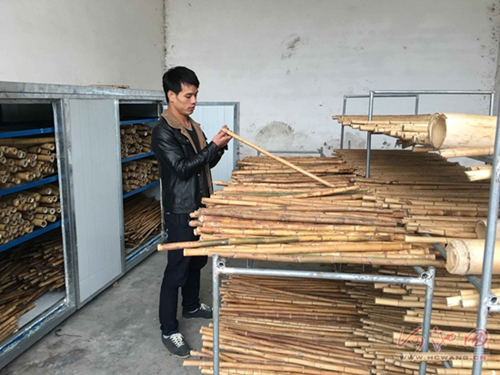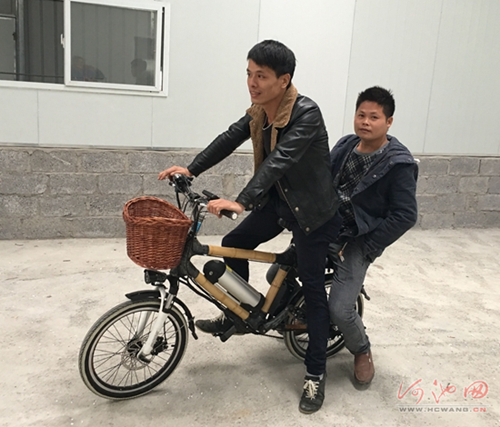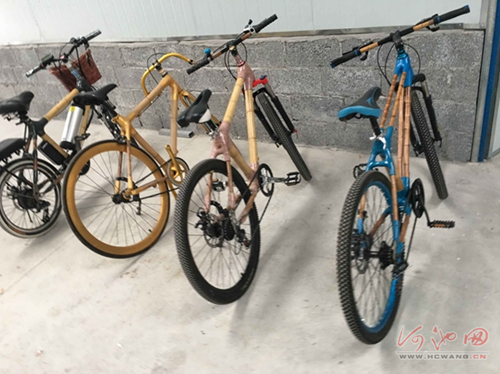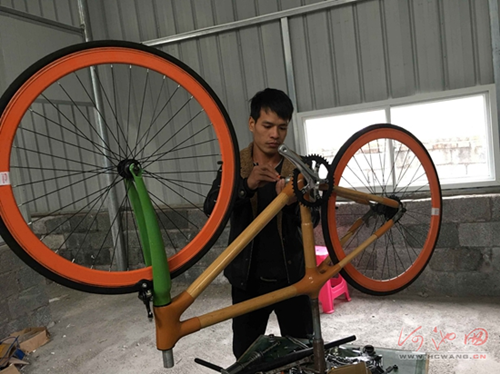Bamboo bikes put Hechi man on road to success
By (chinadaily.com.cn)
2016-12-19
Twenty-eight-year-old, Tan Jiangyong once dreamed of becoming a world famous costume designer, however the fickle hands of fate have made him a world famous bike designer instead. Why are his bikes famous? They're all made of bamboo.
Born in Huanjiang Maonan autonomous county, Hechi, Tan's talent for design was noticed early, and by 2007 he was admitted to study at Shanghai Donghua University.
During his college days, Tan took on several jobs to make ends meet. One day, while working in a bamboo factory, his childhood friend, Tan Chengjie, sent him a photograph of a pair of young boys riding bicycles made of bamboo in Africa – it was love at first sight.
The bikes were like nothing he had ever seen before. "Bamboo bicycles were so interesting to me," said Tan. "They looked so unique and stylish, and I'm sure they would encourage more people to get riding."
But there was just one question lingering -- how could bamboo bikes be strong enough to support a man?
After graduation, Tan set about trying to answer this question, and so established a startup company focused on designing and building bamboo bikes, as well as making other bamboo products.
Together with his close friend, Tan began researching how to make sure the bamboo was strong enough. The pair quickly discovered that the A-frame structure of a bike is extremely rigid and that the bamboo was more than capable to do the job. He looked at similar products on the market, but was unimpressed by their design and only limited use of bamboo.
The partners, Tan and Tan, decided to build their own bike from scratch, complete with a more "natural feeling".
The next obstacle in their way was the city itself. Shanghai is not exactly famous for its bamboo forests, but Tan's small hometown was.
In 2013, Tan finally made the decision to quit the big city in search of his dream costume designing job, and return to his hometown to realize his newly-acquired passion to build bamboo bikes.
Back in Huanjiang, Tan invested all of his money into setting up a workshop, purchasing a sander, cutting and grinding machines.
 |
|
Tan Jiangyong inspects bamboo for use in making his bikes. [Photo/ www.hcwang.cn] |
At the beginning of their first week of operation, the two Tans acquired more than 3,000 pieces of bamboo from local forests, by the end of it, they had completed their first bike.
 |
|
Tan Jiangyong rides one of his bamboo bikes. [Photo/ www.hcwang.cn] |
Tan Jiangyong was so thrilled at the sight of his DIY bamboo bike that he posted a picture of his newly-built treasure on an online bicycle forum. A bicycle enthusiast from Sweden fell in love with Tan's bike and quickly made him an offer of 4,500 yuan ($649). Sold.
That first sale pushed Tan's entrepreneurial spirit and encouraged him to keep rolling along that path. After two year, Tan has raised more than 300,000 yuan in funds from his friends and investors, allowing him to establish a workshop covering almost 1,000 square meters.
 |
|
Several of Tan Jiangyong’s bamboo bikes. [Photo/ www.hcwang.cn] |
Tan's workshop has received more than 500 orders in the past two years for bikes ranging in price from 2,000 yuan to 10,000 yuan depending on each one's quality and style.
As Tan's fame grew and grew, customers from around the world, including Israel and Taiwan, have visited his workshop to place orders for bespoke designed bamboo bikes.
 |
|
Tan Jiangyong works in his workshop. [Photo/ www.hcwang.cn] |
In 2016, Tan was invited by the government to attend several prestigious competitions and events, such as the 2016 Guangxi Youth Innovation and Entrepreneurship Competition and the 6th Guangxi Innovation Exhibition and Trade Fair. His bamboo bike designs have also won a silver medal for its design and creativity.
With his business now fully established, Tan faces new challenges, such as getting his brand noticed by more people and capturing a greater market share. He is also looking at ways in which he can integrate his products with the local Maonan ethnic culture and how to create intricate and dynamic artwork on his bamboo wares.
(Edited by Owen Fishwick)




